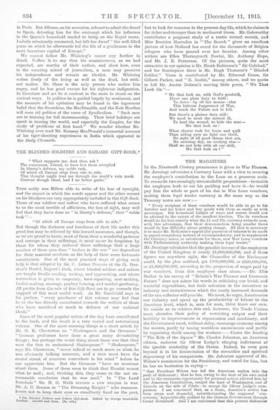THE BLINDED SOLDIERS AND SAILORS GIFT-BOOK.* "What supports me, dost
thou ask ? The conscience, Friend, to have lost them overplied In liberty's defence, my noble task,
Of which all Europe rings from side to side.
This thought might lead me through the world's vain mask Content though blind, had I no better guide."
Tinss nobly was Milton able to write of his loss of eyesight, and the sonnet in which the words appear and the other sonnet on his blindness are very appropriately included in this Gift-Book. Those of our soldiers and sailors who have suffered what seems to us the most terrible of afflictions, the loss of sight, may well feel that they have done so "in liberty's defence," that "noble task "—
" Of which all Europe rings from side to side."
But though the darkness and loneliness of their life under this great loss may be relieved by this inward assurance, and though, as we are proud to know, most of them show a wonderful patience and courage in their sufferings, it must never be forgotten by those for whom they endured those sufferings that a large number of these men thus " broken in the war" are dependent for their material comforts on the help of their more fortunate countrymen. One of the most practical ways of giving such help is that adopted by Mr. C. Arthur Pearson at the St. Dun- stan's Hostel, Regent's Park, where blinded soldiers and sailors are taught Braille reading, writing, and typewriting, and where instruction is given in carpentry, boot-repairing, mat-making, basket-making, massage, poultry farming, and market gardening. All profits from the sale of this Gift-Book are to go towards the support of this most useful work. As Mr. Goodchild says in his preface, "every purchaser of this volume may feel that he or she has directly contributed towards the welfare of those who have sacrificed so much in defence of our national
ideals." .
Some of the most popular artists of the day have contributed to the book, and the result is a very varied and entertaining volume. One of the most amusing things is a short article by Mr. G. K. Chesterton on "Shakespeare and the Germans." "German professors have done a great many devastating things ; but perhaps the worst thing about them was that they were the first to understand Shakespeare." "Shakespeare," says Mr. Chesterton, "never talked so much sense as when he was obviously talking nonsense, and a man must have the sacred streak of nonsense somewhere in his mind" before he can appreciate him. But the Germans "have no nonsense about them. Some of them seem to think that Hamlet meant what he said ; and, thinking this, they come to the not un- reasonable conclusion that he was mad." In "The Land Irortclads " Mr. H. G. Wells invents a new weapon in war. Mr. A. C. Benson in "The Dreaming Knight" asks romance- lovers not to keep their eyes so steadfastly fixed on the past,
* The Blinded Soldiers and Sailors Gift-Book. Edited by Georgo Goodohnd. London : Jarrold and Sous. [U. =LI but to look for romance in the present-day life, which he claims is far richer and stranger than in mediaeval times. Mr. Galsworthy contributes a poignant study of a rustic turned recruit, and Miss Beatrice Harraden in "The Search" gives an excellent picture of how Holland has cared for the thousands of Belgian refugees who have poured over her frontier. Among other writers are Ellen Thorneyaroft Fowler, Mr. Anthony Hope, and Mr. J. E. Patterson. Of the pictures, quite the most attractive in our opinion is Mr. Heath Robinson's "Sir Galahad," and for frontispiece there is Mr. Hugh Thomson's "Blinded Soldier." Verse is contributed by Mr. Edmund Gosse, Sir Gilbert Parker, and "E. Nesbit," among others, and we quote in full Mr. Austin Dobson's moving little poem, "We That Look On "-- " We that look on, with God's goodwill, Have one plain duty to fulfil :
To drive—by all fair means—afar This hideous Juggernaut of War, And teach the Future not to kill.
But there's a plainer duty still : We need to meet the instant ill,
To heal the wound, to hide the soar—
We that look on What clearer task for brain and quill Than aiding eyes no light can thrill, No sight of all good things that are,
No morning sky, no evening star— Shall we not help with all our skill,
We that look on "


















































 Previous page
Previous page